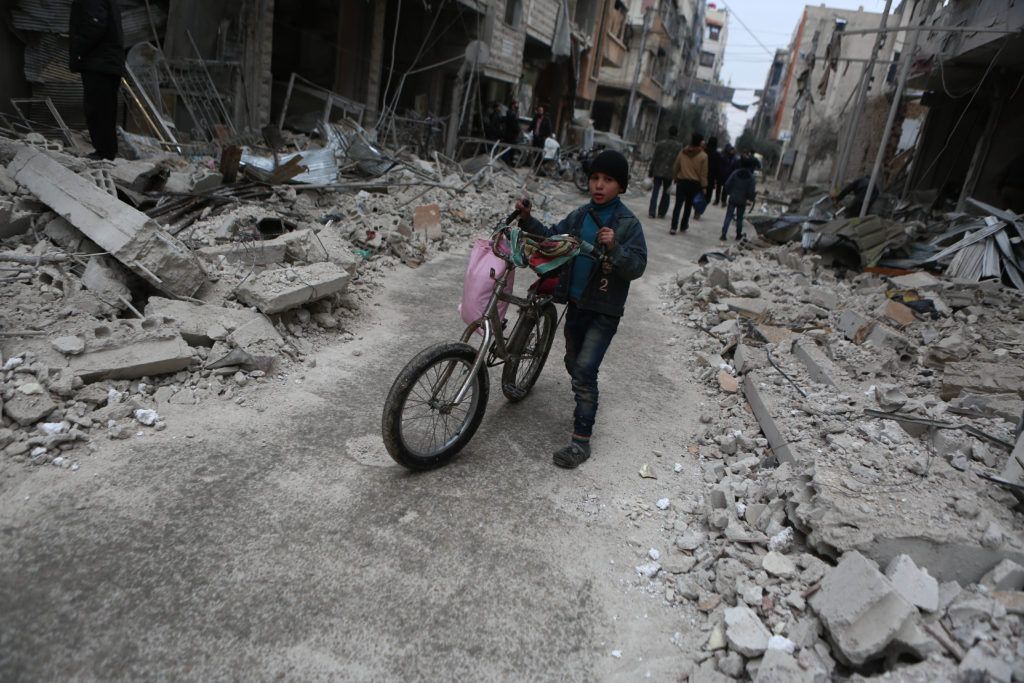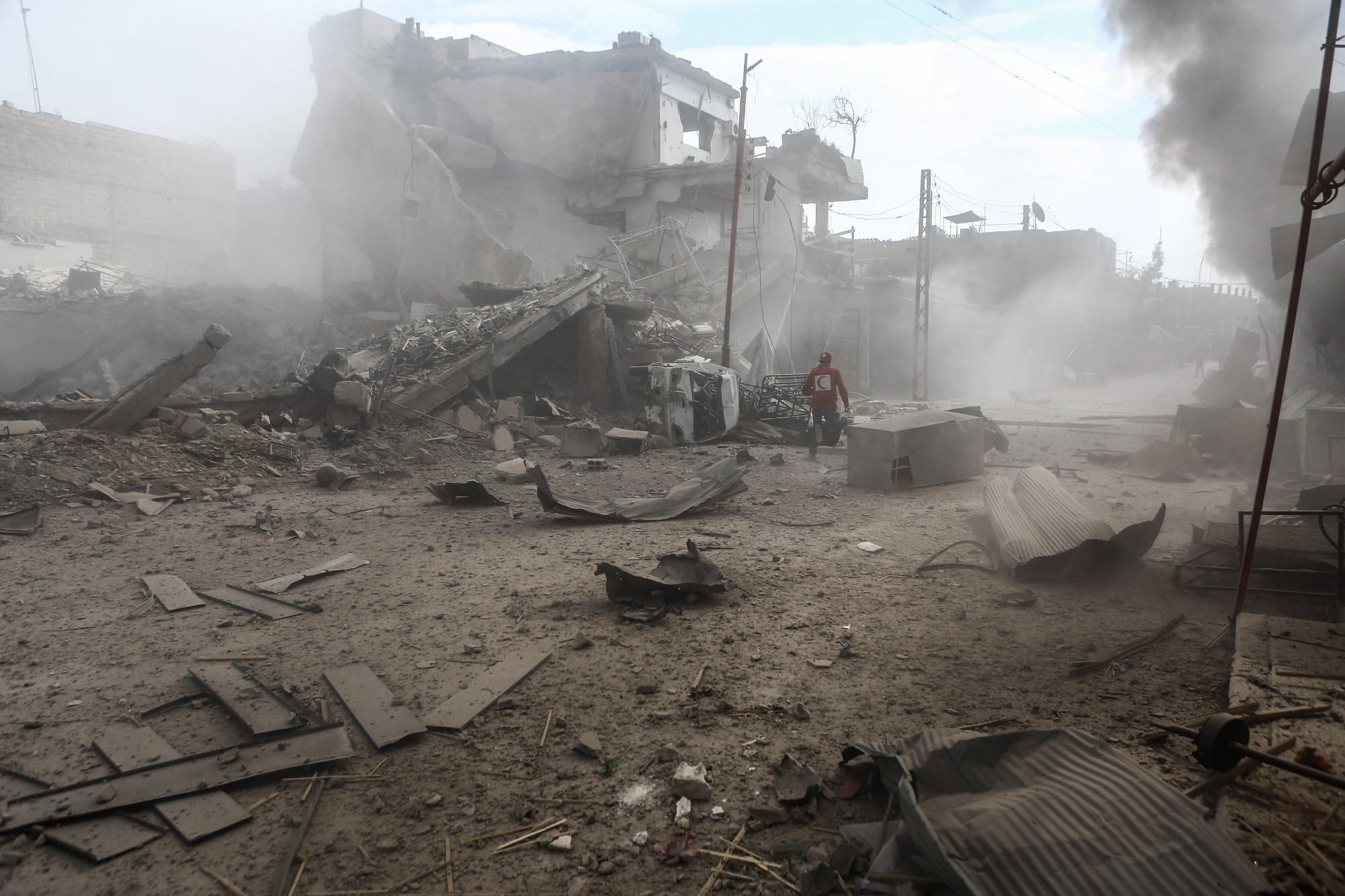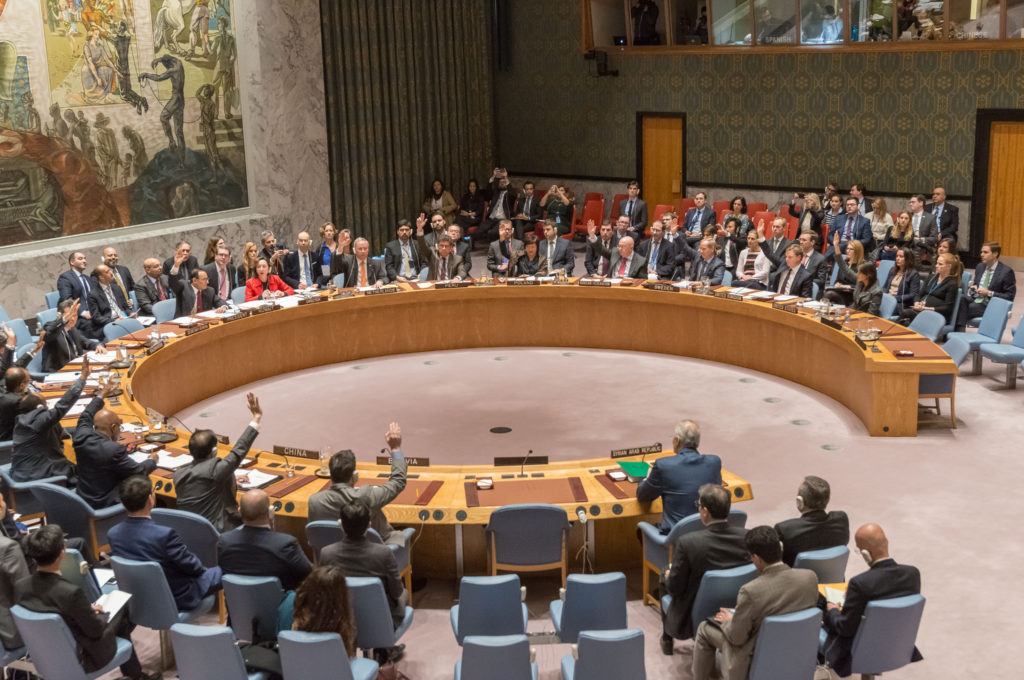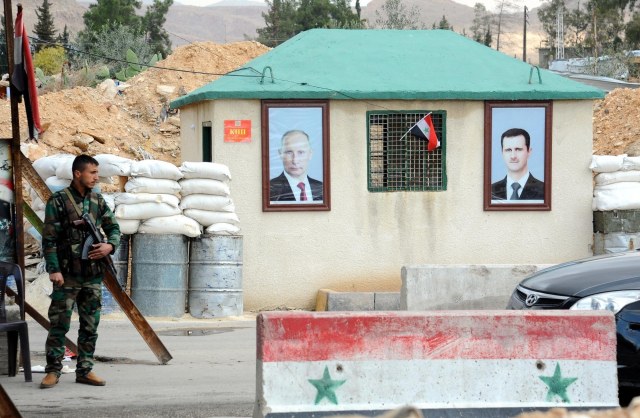
“Eastern Ghouta cannot wait,” says Antonio Guterres, United Nations Secretary General. “It’s high time to stop this hell on earth.”
Since civil war broke out in Syria in 2011, part of the broader wave of Arab Spring protests, the conflict has claimed the lives of some 600,000 people. Another 13 million have been displaced, causing not only widespread human suffering, but also Europe’s most serious refugee crisis since the Second World War.
In Eastern Ghouta, close to the capital, Damascus, an estimated 700 civilians perished last week, after sustained and devastating bombardment by Syrian government forces and their Russian allies. With access to aid blocked in three major population centres across Syria, all of them strongholds for anti-Assad forces, the UN says the “scale of human suffering has reached unprecedented levels”.

During the early years of this war, Syria was often headline news in the US, UK and other Western nations. In 2013, after Bashar al-Assad launched a sarin nerve gas attack killing over 1,000 people, also in Eastern Ghouta, the West faced a much-discussed dilemma. Barack Obama had previously warned of “direct military intervention” if chemical weapons were used. But, in the face of Assad’s transgression, the then US President hesitated – a decision that followed the UK Parliament voting against intervention.
Since then, Western media attention has been sporadic. This may be due in part to the leading role that Russia has played in this conflict, supporting Assad in defiance of the US and the broader Nato alliance. With long-standing economic and cultural links to its near neighbour, and keen to protect its access to Syria’s Mediterranean ports, Moscow told Obama it would remove Assad’s chemical weapons stockpile – a ploy Obama was forced to accept.
That’s because, in both the US and UK, it was clear then and remains evident now that there is simply no public appetite for military intervention in the Middle East – at least in the form of ‘boots on the ground’. After previous campaigns in Afghanistan and Iraq, costly in terms of money and lives, Western voters – even in countries known for their military might – are extremely skeptical of involvement in far-flung wars.
US and British forces did directly intervene in Syria and Iraq as part of a multinational coalition in 2015 – but that was to fight the direct threat of Isis, rather than a more general effort to “uphold democracy” or otherwise determine the direction of strategically important nations such as Syria. And President Trump launched cruise missile strikes last April after Assad attacked the town of Khan Sheikhoun, again reportedly with sarin.
For the most part, though, the West has effectively outsourced the ‘external management’ of Syria’s ferocious civil war to Moscow. This is, for much of the West’s military and political establishment, a source of intense embarrassment and concern. Events in Syria – with Washington largely standing by and Moscow quite literally calling the shots – pose a serious challenge to America’s long-standing role as ‘global policeman’.

Now, with the UN declaring itself “almost powerless” to respond to a “dramatic deterioration in the humanitarian situation”, Syria is back on our television screens. Calls for a ceasefire in this seven-year war, initially blocked by Russia, are now being partially heeded. Moscow has ordered its allies in Syria to observe daily five-hour bombardment pauses – which not only allows aid workers to bring relief and supplies to the most devastated areas, but means access for Western TV cameras too, ensuring prime-time coverage.
So, with the tragedy of Syria reinstated in our collective consciousness courtesy of a Russian-engineered ceasefire, what is to be done? UN peace talks in Geneva failed last December. Rival talks held under the auspices of Russia, Iran and Turkey in Sochi last month also ended inconclusively. Any assessment from afar, any list of ideas, will inevitably appear glib in the face of such a tragic and tortuously complex situation. That said, certain key principles must be observed if there is to be any hope of restoring relative stability and hope to Syria, the Levant region and the broader Middle East.
- Peace talks have failed so far as they have not brought the leaders of warring military forces face to face. Only American and Russia, working together, can make such a summit happen.
- Talks must involve all the key powers in the region and interested parties beyond. This includes Iran – which has been emboldened by the Syria conflict to attack Saudi forces in Yemen, while linking up its Syrian-based forces with Hezbollah in Lebanon.
- Meaningful talks, and an effective resolution, are far less likely to happen as long as this conflict is viewed, in both Washington and Moscow, and by their respective press corps, as a renewed Cold War.
- For Western voters, the only war that really matters is against Islamist terrorism – and despite no longer controlling Raqqa and Mosul, Isis is far from finished. Such terrorism – feared by the Russian public, as much as by voters in the US and Britain – is the common enemy. Tackling that, rather than the threat posed by each other, needs to be the focus in Washington, Moscow, London and elsewhere.
- With US-backed forces facing off against Turkish-backed forces in northern Syria, Nato is in an entirely incoherent position. Two member states are pitched against one another. The longer that continues, the more damage will be done to the authority and standing of a military organisation of vital importance to the entire world. That, too, should focus minds on finding a solution.
- Assad retains considerable backing across Syria. At the very least, a substantial minority of Syrians support him – meaning he has to be part of any solution, even if that’s amounts to agreeing to a Russian-backed managed exit from power.
- Western powers should not forget that Russia also wants a solution. The respected daily Russian paper Kommersant recently cited polls showing that two thirds of the Russian public want direct military involvement in Syria to end. That may be one reason Putin facilitated ceasefires, to put Syria back in the headlines, so generating momentum for a broader peace effort following failure in both Geneva and Sochi.
- America must of course also be involved – not only on account of its unmatched military power but still very considerable regional influence, not least with Israel. But such is the skepticism of the public, in the US and its key allies such as Britain, that it may be that troops can only be deployed on the ground under the auspices of a jointly-commanded UN peace-keeping force.

Seven years in, the implications of this Syrian conflict have spread far and wide – to say nothing of the on-going humanitarian tragedy. Russia has been empowered, to the chagrin of the West, but it is naïve in the extreme not to recognise that Russia must be part of any sustainable solution.
While the notion of unchallenged US hegemony has been dented in Syria, America still has a significant and vital role to play in securing and maintaining peace across the region. And while all sides have abused the UN – not least America and the UK with its illegal Iraq campaign and Russia by blocking successive ceasefire proposals – this Syria conflict could be the moment when the UN re-establishes itself as the world’s most important multi-lateral body.










Join the discussion
Join like minded readers that support our journalism by becoming a paid subscriber
To join the discussion in the comments, become a paid subscriber.
Join like minded readers that support our journalism, read unlimited articles and enjoy other subscriber-only benefits.
Subscribe